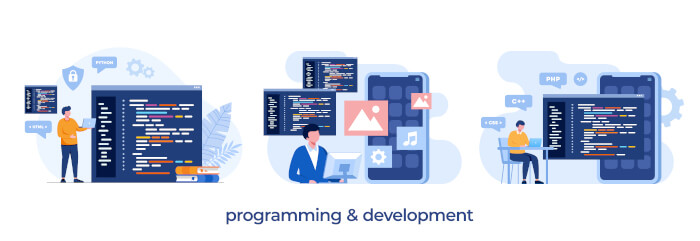vibe.d is a high-performance asynchronous I/O, concurrency and web application toolkit.
It already contains many supplemental features such as database support to be able to offer a complete development environment.
For more specialized needs, there are also many compatible DUB packages available.
vibe.d is free and open source software.
Features include:
- Full integrated web framework – contains a complete set of tools needed for website and web service development. In addition to a HTTP 1.0/1.1 server, static file serving, an efficient template system, WebSockets, sessions and other features are already integrated. Surrounding features include a markdown filter, MongoDB and Redis drivers, cryptography, natural JSON and BSON support and a simple SMTP client.
- Automatically generate JSON/REST or HTML form based interface from D classes, removing a lot of work and potential for bugs due to avoiding boilerplate code.
- Native database drivers – contains built-in support for MongoDB and Redis databases. These drivers provide a default for fast and flexible data storage. More database drivers are available in the DUB package registry, for example a vibe.d compatible MySQL driver.
- Generic concurrency tools.
- Graphical user interface integration – fully integrates with the UI event loop, so that it can be used to power applications with a graphical user interface.
- Uses asynchronous I/O under the hood, but at the same time make it seem as if all operations were synchronous and blocking, just like ordinary I/O.
- Compact API – common tasks are kept as short and high level as possible, while still allowing fine grained control if needed. By using some of D’s advanced features, typical vibe.d based programs reach a level of conciseness that usually only scripting languages such as Ruby can offer.
- Integrated load balancer is able to dynamically compile, run and test new processes before switching them live after the code has been modified. This allows for seamless and low-risk changes on live-systems.
- Exception based error handling.
- Multi-threading support.
- Natively compiled code.
Website: vibed.org
Support: Documentation, GitHub Code Repository
Developer: Sönke Ludwig
License: GNU Affero General Public License v3.0
vibe.d is written in D. Learn D with our recommended free books and free tutorials.
| Popular series | |
|---|---|
| The largest compilation of the best free and open source software in the universe. Each article is supplied with a legendary ratings chart helping you to make informed decisions. | |
| Hundreds of in-depth reviews offering our unbiased and expert opinion on software. We offer helpful and impartial information. | |
| The Big List of Active Linux Distros is a large compilation of actively developed Linux distributions. | |
| Replace proprietary software with open source alternatives: Google, Microsoft, Apple, Adobe, IBM, Autodesk, Oracle, Atlassian, Corel, Cisco, Intuit, SAS, Progress, Salesforce, and Citrix | |
| Awesome Free Linux Games Tools showcases a series of tools that making gaming on Linux a more pleasurable experience. This is a new series. | |
| Machine Learning explores practical applications of machine learning and deep learning from a Linux perspective. We've written reviews of more than 40 self-hosted apps. All are free and open source. | |
| New to Linux? Read our Linux for Starters series. We start right at the basics and teach you everything you need to know to get started with Linux. | |
| Alternatives to popular CLI tools showcases essential tools that are modern replacements for core Linux utilities. | |
| Essential Linux system tools focuses on small, indispensable utilities, useful for system administrators as well as regular users. | |
| Linux utilities to maximise your productivity. Small, indispensable tools, useful for anyone running a Linux machine. | |
| Surveys popular streaming services from a Linux perspective: Amazon Music Unlimited, Myuzi, Spotify, Deezer, Tidal. | |
| Saving Money with Linux looks at how you can reduce your energy bills running Linux. | |
| Home computers became commonplace in the 1980s. Emulate home computers including the Commodore 64, Amiga, Atari ST, ZX81, Amstrad CPC, and ZX Spectrum. | |
| Now and Then examines how promising open source software fared over the years. It can be a bumpy ride. | |
| Linux at Home looks at a range of home activities where Linux can play its part, making the most of our time at home, keeping active and engaged. | |
| Linux Candy reveals the lighter side of Linux. Have some fun and escape from the daily drudgery. | |
| Getting Started with Docker helps you master Docker, a set of platform as a service products that delivers software in packages called containers. | |
| Best Free Android Apps. We showcase free Android apps that are definitely worth downloading. There's a strict eligibility criteria for inclusion in this series. | |
| These best free books accelerate your learning of every programming language. Learn a new language today! | |
| These free tutorials offer the perfect tonic to our free programming books series. | |
| Linux Around The World showcases usergroups that are relevant to Linux enthusiasts. Great ways to meet up with fellow enthusiasts. | |
| Stars and Stripes is an occasional series looking at the impact of Linux in the USA. | |
